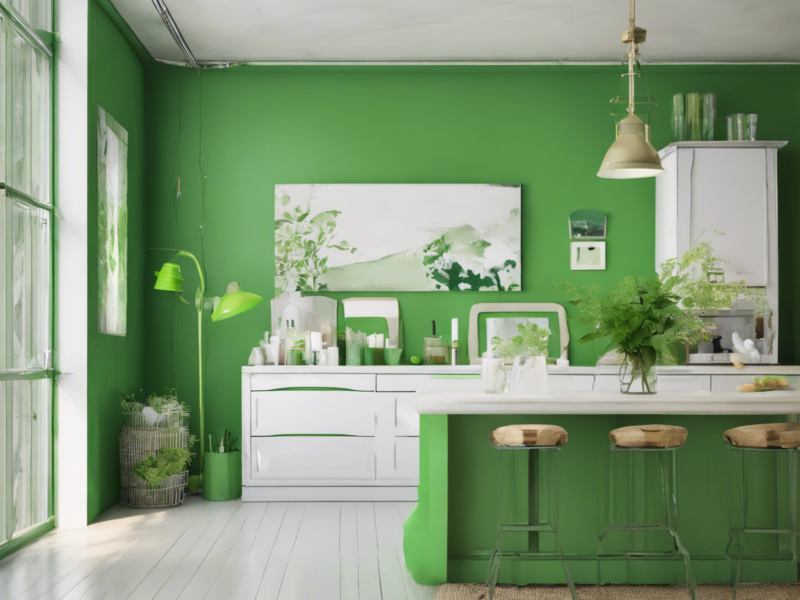Have you ever walked into a room and instantly felt more relaxed and at ease because of the presence of vibrant green plants? The benefits of incorporating greenery into your living or working space go far beyond just aesthetics. Research shows that indoor plants can improve air quality, boost mood, increase productivity, and even reduce stress levels. Whether you have a green thumb or struggle to keep plants alive, there are numerous options available to suit your lifestyle and space.
Health Benefits of Indoor Plants
Indoor plants do more than just add a touch of nature to your surroundings – they can also significantly enhance your overall well-being. Here are some key health benefits associated with having indoor plants:
1. Improved Air Quality
Plants act as natural air purifiers by absorbing toxins and producing oxygen through photosynthesis. The presence of plants indoors can help reduce pollutants such as carbon dioxide, formaldehyde, and benzene, creating a healthier environment for you to breathe in.
2. Stress Reduction
Bringing a bit of nature into your indoor spaces can have a calming effect on your mind and body. Studies have shown that simply being around plants can help lower stress levels, anxiety, and even blood pressure. Green plants can promote a sense of relaxation and well-being, making your home or office a more peaceful place to be.
3. Enhanced Mood and Productivity
The sight of greenery has been linked to improved mood and increased productivity. Indoor plants can help create a positive atmosphere that fosters creativity, focus, and overall mental well-being. Whether you’re working from home or studying for exams, having plants around can boost your mood and make you feel more energized.
Choosing the Right Indoor Plants
When it comes to selecting indoor plants, it’s essential to consider factors such as lighting conditions, space availability, and maintenance requirements. Here are some popular indoor plants that are easy to care for and can thrive in various environments:
1. Snake Plant (Sansevieria trifasciata)
Snake plants are known for their hardy nature and ability to thrive in low light conditions. They require minimal watering and are excellent air purifiers, making them ideal for bedrooms or offices.
2. Pothos (Epipremnum aureum)
Pothos plants are versatile and low-maintenance, making them perfect for beginners. They can tolerate low light and irregular watering, making them a popular choice for hanging baskets or shelves.
3. Spider Plant (Chlorophytum comosum)
Spider plants are easy to grow and are excellent at removing indoor air pollutants. They thrive in bright, indirect light and produce baby plantlets that can be propagated to expand your plant collection.
4. Peace Lily (Spathiphyllum)
Peace lilies are renowned for their graceful white blooms and ability to thrive in low light. They help purify the air and add a touch of elegance to any room, making them a favorite choice for indoor spaces.
Care Tips for Indoor Plants
To ensure your indoor plants thrive and continue to benefit your space, it’s crucial to provide them with the right care and attention. Here are some essential care tips to keep your indoor plants happy and healthy:
1. Watering: Avoid overwatering by allowing the soil to dry out slightly between waterings. Different plants have varying watering needs, so it’s essential to research the specific requirements of each plant.
2. Light: Place plants according to their light preferences – some thrive in bright, indirect light, while others prefer low light conditions. Rotate plants occasionally to ensure they receive even light exposure.
3. Humidity: Indoor plants may benefit from increased humidity, especially during the winter months when indoor air can be dry. Consider placing a small humidifier near your plants or misting them occasionally.
4. Fertilizing: Feed your plants with a balanced fertilizer during the growing season to promote healthy growth. Be sure to follow the instructions on the fertilizer package and avoid over-fertilizing, which can harm the plants.
5. Cleaning: Dust can accumulate on plant leaves, affecting their ability to photosynthesize efficiently. Gently wipe the leaves with a damp cloth or give them a shower to keep them clean and healthy.
Frequently Asked Questions (FAQs) about Indoor Plants
1. Which indoor plants are best for beginners?
Answer: Snake plants, pothos, and spider plants are excellent choices for beginners due to their hardy nature and low maintenance requirements.
2. How often should indoor plants be watered?
Answer: The frequency of watering depends on factors such as plant type, soil moisture, and light levels. It’s best to check the soil moisture level before watering to prevent overwatering.
3. Can indoor plants thrive in low light conditions?
Answer: Yes, some plants like snake plants, pothos, and peace lilies can thrive in low light environments, making them suitable for spaces with limited natural light.
4. Do indoor plants need fertilizer?
Answer: Indoor plants can benefit from occasional fertilization during the growing season to replenish nutrients in the soil and promote healthy growth.
5. How can I prevent pests from affecting my indoor plants?
Answer: Regularly inspect your plants for signs of pests such as mealybugs, spider mites, or aphids. You can use natural remedies like neem oil or insecticidal soap to control pest infestations.
6. Are there any indoor plants that can help improve air quality?
Answer: Yes, plants like snake plants, peace lilies, spider plants, and pothos are known for their air-purifying properties and can help remove toxins from indoor air.
7. What are the benefits of having plants in the workplace?
Answer: Indoor plants in the workplace can boost employee morale, improve air quality, reduce stress levels, and enhance productivity and creativity.
8. Can indoor plants help reduce noise levels in a room?
Answer: While indoor plants may not significantly reduce noise levels, they can help absorb some sound and create a more peaceful environment.
9. Are there any plants that are pet-friendly and safe to have around animals?
Answer: Plants like spider plants, African violets, and Boston ferns are considered pet-friendly and safe to have around cats and dogs.
10. How can I increase humidity for my humidity-loving plants?
**Answer**: You can increase humidity for plants that require higher moisture levels by placing a **pebble tray filled with water** near the plants or using a room humidifier.
In conclusion, indoor plants offer a myriad of benefits for both your physical and mental well-being. By choosing the right plants, providing proper care, and creating a conducive environment, you can transform your space into a green oasis that promotes health, happiness, and productivity. Whether you’re a seasoned plant enthusiast or new to the world of indoor gardening, incorporating green plants into your surroundings is a simple yet effective way to revitalize your space and elevate your quality of life.

